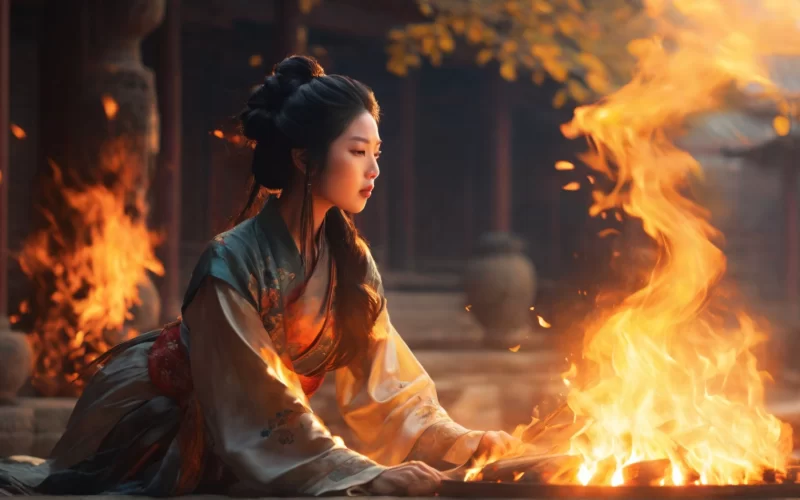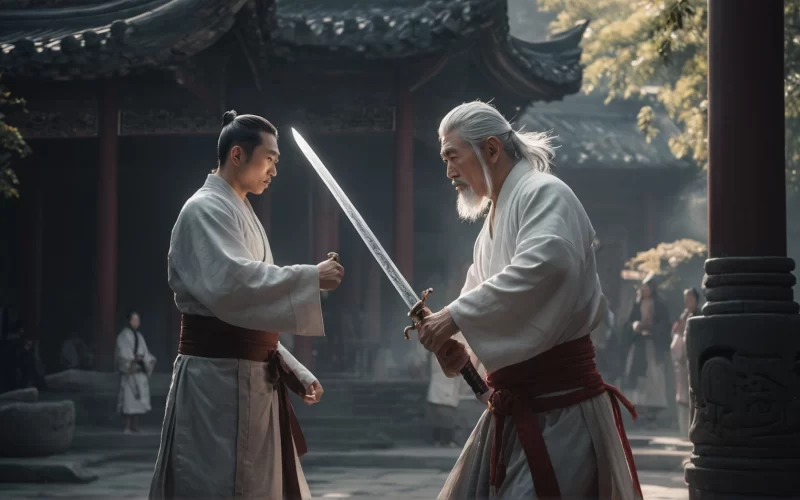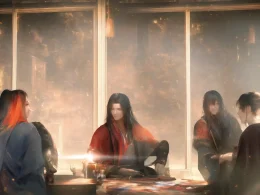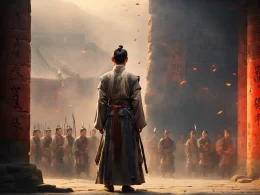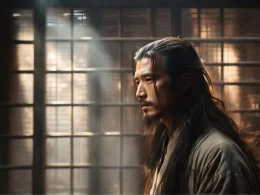Idiom Explanation:
一尘不染:Originally, it is a Buddhist term. Buddhists call color, sound, fragrance, taste, touch, and dharma the "six dusts", and say that one should not be defiled by the six dusts and keep one's mind pure. However, this idiom is now more often used to describe the cleanliness and tidiness of the environment.
Pronunciation:
一尘不染
yī chén bú rǎn
origin:
唐·释道世《法苑珠林》:“若菩萨在乾土山中经行,土不著足,随岚风来,吹破土山,令散为尘,乃至一尘不著佛身。”
Tang - Shi Dao Shi, "Dharma Garden Zhu Lin": "If a bodhisattva is walking in a mountain of dry earth, the earth does not touch his feet, and when the wind comes and blows through the mountain of earth, it scatters into dust, and even a dust does not touch the body of the Buddha."
story:
During the reign of Emperor Gaozong of the Tang Dynasty, Master Hong Ren opened his temple to teach, and at that time he had more than 500 disciples under him, the most wise one being the eldest disciple Shenxiu. Shenxiu, commonly known as Li, was a native of Chenliu Yushi (now Yushi County, Henan Province). As a Confucian student in his youth, he traveled to the south of the Yangtze River and studied the scriptures and history. In the eighth year of the Tang Emperor Wu De (625 AD), Shen Xiu became a monk at the Tian Gong Temple in Luoyang. At the age of fifty, he crossed the mountain and traveled thousands of miles to join the disciples of Hong Ren, and engaged in such labor as fetching firewood and drawing water to seek the Dharma. For six years, he served Hong Ren day and night, and was highly valued by him, so he was promoted to the rank of chief disciple. At that time, Shenxiu was recognized as the heir to the Zen Buddhist mantle.
It is said that one year, Hong Ren suddenly felt that he was getting old, so he wanted to find a successor among his disciples. On that day, he called all the monks together and asked each of them to make a verse (the Sanskrit word for "chant") in order to find out the depth of each one's path. Shenxiu was so enlightened that he immediately inscribed a verse on the corridor wall of the temple: "The body is a bodhi tree, the mind is like a clear mirror. Always wipe it away, don't make it dusty."
The "bodhi tree" mentioned in the verse, that is, the ancient Indian biblical tree, it is an ordinary tree like poplar, willow, tung, acacia. The young Prince Siddhartha, after six years of asceticism, sat under a biblical tree and attained enlightenment, and was revered as Siddhartha Gautama. In remembrance of the Buddha's immortal virtue of realizing the truth of life, people called the biblical tree that sheltered him during his enlightenment the Bodhi tree, or the tree of enlightenment. After seeing it, Master Hong Ren was so impressed that he asked all the monks to recite this verse.
Later, when Hui Neng heard someone recite the verse composed by Shenxiu, he exclaimed, "It does sound wonderful! Unfortunately, the realm is not very high." At night, Hui Neng asked a monk who could write to inscribe a verse of his own next to Shenxiu's verse: "Bodhi is not a tree, nor is a mirror a platform. There is not a single thing in the first place, and there is no place to stir up dust."
The main meaning of Huineng's verse is that the world is empty, and everything in the world is empty. If the mind is empty, there is no need to resist the temptation of the outside world, and everything passes through the mind without leaving a trace. This is a very high state of Zen Buddhism, and those who have realized this state are the so-called enlightened.
When Master Hong Ren saw this verse, he asked those around him who had written it, and when he heard that it was Hui Neng, he ordered him to be called in and criticized Hui Neng in public, "What you have written is nonsense, simply nonsense!" After saying that, he erased the verse himself, then struck Huineng three times on the head, turned around and left. Among all the monks, only Hui Neng truly understood the meaning of the Fifth Patriarch. That night, at the third hour, Hui Neng came to Hong Ren's meditation room. There, Hong Ren explained to him one of the most important classics of Buddhism, the Vajra Sutra, and passed on the mantle to him.
After attaining the Dharma, Hui Neng quietly returned to the south and lived in seclusion for fifteen years before heading to the Baolin Temple in Cao Xi. He then went on to speak the Mahabharata Paramita Dharma and teach the precepts of non-virtuousness at Shaozhou Dafan Monastery. The disciples who succeeded him included Xingsi, Huaijan, Shenhui, Xuanjue, Huizhong, Fahai, and more than forty others. Later, Fahai gathered Huineng's words and deeds for the Sixth Patriarch's Tanjing, which is the Southern Sect. After the death of Hongneng, Shenxiu went to Yuquan Temple in Danyang Mountain, Jingzhou, and for more than twenty years, his disciples gathered, which is the Northern Sect. Through the promotion of Shenhui, the Southern Sect became the orthodoxy of Zen Buddhism and has been the only one in the world ever since. In contrast, the Northern Sect founded by Shenxiu was lonely and died out after a few generations.
Similar Idioms:
- 一干二净
- 冰清玉洁







